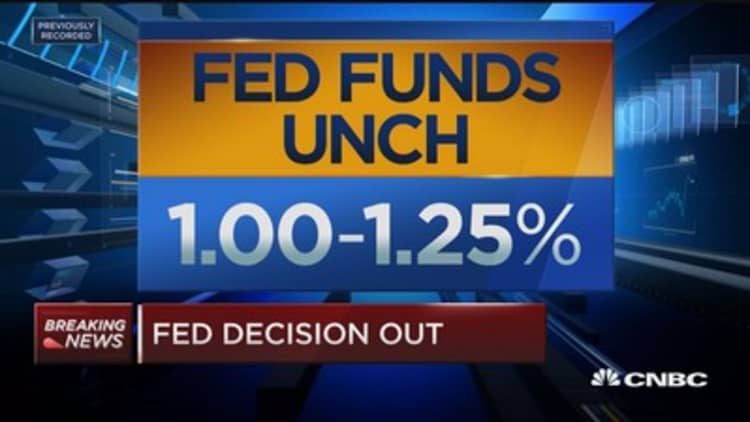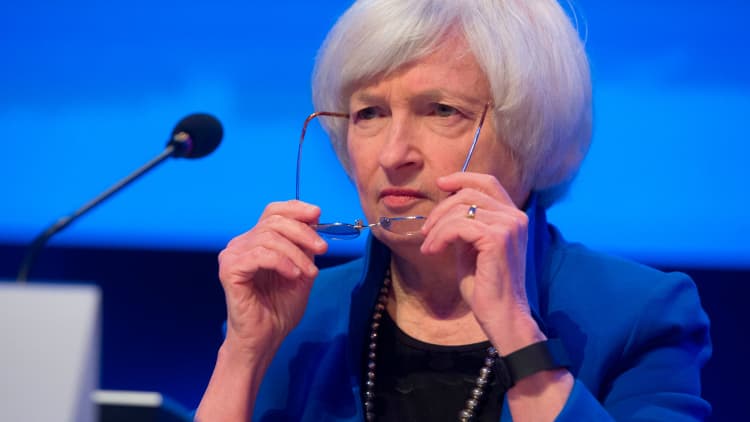
The Federal Reserve declined to raise interest rates at its policy meeting this week and said the late-summer hurricanes likely will not have much longer-term impact on overall economic activity.
There was little in the post-meeting statement Wednesday to indicate that the Fed would hold off on raising rates again soon.
As widely anticipated, the Federal Open Market Committee, the central bank's policymaking arm, held its benchmark interest rate target between 1 percent and 1.25 percent. Markets also figure the Fed will approve a quarter-point hike at the December meeting, though the committee chose not to tip its hand overtly in Wednesday's statement.
However, it did maintain positive language on the current state of the economy.
"There's no signal from today's meeting that there's any risk that December has been altered," said Michael Arone, chief investment strategist at State Street Global Advisors. "With the economy growing at roughly 3 percent, with unemployment at 4.2 percent, with very easy monetary conditions and a modest uptick in inflation expectations, everything leads me to believe that they'll be raising rates in December."
This was the second meeting since Hurricanes Harvey and Irma caused record-breaking damage that nonetheless has had only spotty impacts on macro data.
Nonfarm payrolls, for instance, declined in September by 33,000, but the committee said those kinds of effects will pass. Gross domestic product, on the other hand, grew 3 percent in the third quarter, according to an initial government estimate that was ahead of Wall Street forecasts.
In fact, the committee statement noted that the "labor market has continued to strengthen and that economic activity has been rising at a solid rate despite hurricane-related disruptions. Although the hurricanes caused a drop in payroll employment in September, the unemployment rate declined further."
The statement noted that gasoline prices rose following the storms, but other inflation indicators remained muted. The committee conceded that inflation is still "running below 2 percent," the target that the Fed feels is most suited to healthy growth.
"Hurricane-related disruptions and rebuilding will continue to affect economic activity, employment and inflation in the near term, but past experience suggests that the storms are unlikely to materially alter the course of the national economy over the medium term," the statement said.
The Fed already has raised rates twice this year as part of a program for a slow but steady normalization of monetary policy. In addition to the rate hikes, the Fed in October began the process of gradually reducing its $4.5 trillion balance sheet, which mostly contains bonds the central bank purchased to stimulate the economy by lowering mortgage rates and steering investors to risk assets like stocks and corporate bonds.
Post-meeting documents Wednesday made only brief mention of the balance sheet reduction, in which the Fed will allow a capped level of proceeds from its maturing bonds to roll off each month. The statement merely said the program "is proceeding."
Despite the efforts to tighten policy, economic conditions have remained loose and the stock market continues to rally. Some FOMC members have worried about the lack of impact the Fed's moves have had and fear that delaying tightening could promote asset bubbles and financial instability.
This week's gathering likely will be the last before markets find out who will be the next Fed chair. President Donald Trump is expected to release his decision Thursday afternoon, with only a slight chance that Chair Janet Yellen will be reappointed. Markets expect the president to name Fed Governor Jerome "Jay" Powell to lead the central bank.
WATCH: Measured Fed decision means December hike likely



